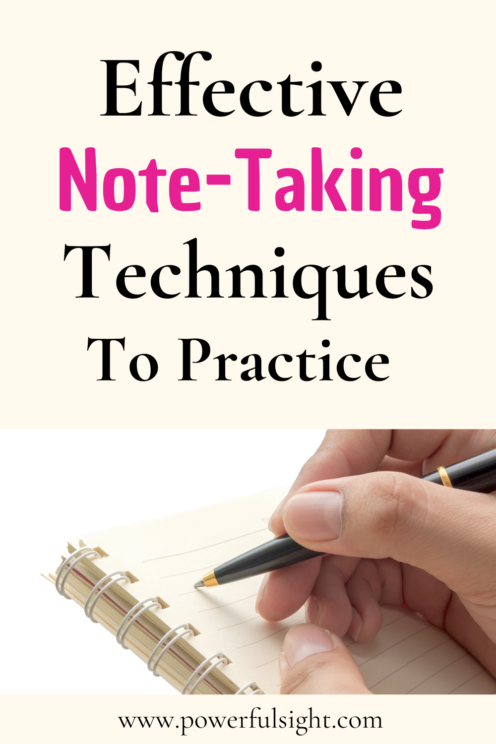Are you struggling to keep track of important information in class? Taking effective notes is an essential skill for academic success, but it’s often overlooked. Continue reading to find out how to take notes in class for effective reading.
Start boosting your productivity and academic performance today by honing your note-taking skills. Let’s dive in and unlock the secrets to becoming a note-taking pro!
Save the pin for later

The Importance of Taking Notes for School
Taking notes in school is more than just a way to passively record information. It is an active process that engages your mind and helps you retain and understand the material better. Here are some reasons why taking notes is crucial for academic success:
- Enhances Focus and Attention: When you take notes, you are actively listening and processing information. This helps you stay focused and prevents your mind from wandering during class.
- Improves Comprehension and Retention: Writing down information helps you better understand and remember it. By summarizing key points and concepts in your own words, you are more likely to internalize the material.
- Facilitates Review and Study: Well-organized notes are invaluable study aids. They provide a concise summary of the material, making it easier to review and study for exams.
Related: Good habits to start in college as a student
Effective Note-Taking Methods and Techniques
Now that you understand the importance of taking notes, let’s explore some effective methods and techniques to improve your note-taking skills:
- Active Listening: Actively engage with the material by listening attentively to your teacher or professor. Take note of important concepts, examples, and explanations. Look for verbal cues that indicate the significance of certain information.
- Use Keywords and Abbreviations: Instead of writing complete sentences, focus on capturing key ideas and concepts using keywords and abbreviations. This allows you to take notes more quickly without sacrificing important information.
- Create Clear Outlines: Organize your notes using headings, subheadings, and bullet points. This creates a clear structure that makes it easier to review and understand your notes later on.
- Utilize Visual Aids: Incorporate diagrams, charts, and graphs into your notes whenever possible. Visual aids can help you better understand complex concepts and make connections between different ideas.
Related: Good study habits to develop as a student
Choosing the Right Note-Taking Tools
The choice of note-taking tools depends on personal preference and the learning environment. Here are some popular options to consider:
- Pen and Paper: Traditional pen and paper can be a reliable and flexible choice. It allows for more freedom in formatting and the ability to sketch diagrams or illustrations.
- Digital Note-Taking Apps: There are numerous digital note-taking apps available that offer features like cloud storage, searchability, and synchronization across devices. Some popular options include Evernote, OneNote, and Google Keep.
- Voice Recording Apps: For subjects that involve a lot of verbal information, consider using voice recording apps to capture lectures or discussions. This can be a useful supplement to written notes.
Related: How to study after a long break
Structuring Your Notes for Easy Reference
Well-structured notes are easier to navigate and review. Here are some tips for organizing your notes effectively:
- Use Headings and Subheadings: Divide your notes into logical sections using headings and subheadings. This allows you to quickly locate specific information when reviewing your notes.
- Number or Bullet Points: Utilize numbering or bullet points to create a hierarchical structure within your notes. This helps in organizing information and makes it easier to understand the relationships between different ideas.
- Leave Space for Additions: As you review your notes or obtain additional information, leave space for adding new details. This will ensure that your notes remain organized and up-to-date.
Related: Best study routines for students
Active Listening and Note-Taking in Class
Active listening is a crucial component of effective note-taking. Here are some strategies to help you maximize your listening skills in class:
- Be Present and Engaged: Arrive to class on time, eliminate distractions, and actively participate in discussions. Engaging with the material will help you absorb and understand the information better.
- Focus on Key Points: Listen for cues from your teacher or professor that indicate important information. These could be repeated phrases, emphasized words, or direct statements about the significance of certain concepts.
- Ask Questions: Don’t hesitate to ask questions if something is unclear. This not only helps clarify your understanding but also demonstrates your active engagement in the learning process.
Related: How to become an A student
Note-Taking Strategies for Different Subjects
Different subjects may require different note-taking approaches. Here are some subject-specific strategies to consider:
- Math and Sciences: Focus on capturing key formulas, equations, and examples. Draw diagrams and graphs whenever necessary to visualize concepts.
- Literature and Humanities: Summarize main ideas, themes, and character developments. Take note of significant quotes and examples that illustrate the author’s message.
- History and Social Sciences: Highlight important dates, events, and historical figures. Create timelines or flowcharts to understand the sequence and connections between different historical events.
Related: How to prepare for exams
Reviewing and Revising Your Notes
Regularly reviewing and revising your notes is essential for long-term retention and understanding. Here’s how you can make the most out of your review sessions:
- Schedule Regular Review Sessions: Set aside dedicated time to review your notes on a regular basis. This helps reinforce the material and identify any gaps in your understanding.
- Condense and Summarize: As you review your notes, condense the information into key points and summaries. This will make it easier to recall and understand the material during exams.
- Test Yourself: Use practice quizzes or self-created questions to test your knowledge and understanding. This active retrieval process enhances retention and helps identify areas that need further study.
Related: How to create a good study timetable
Using Technology for Note-Taking
Technology can enhance your note-taking experience and provide additional functionalities. Here are some ways to utilize technology for effective note-taking:
- Digital Annotation Tools: Use tools like Adobe Acrobat or Microsoft OneNote to annotate and highlight PDFs or digital textbooks. This allows you to mark important information directly on the document.
- Mobile Apps for On-the-Go Notes: Install note-taking apps on your smartphone for quick and convenient note capture. These apps often have features like voice recording, image insertion, and cloud synchronization.
- Collaborative Note-Taking: If you are involved in group projects or collaborative work, consider using platforms like Google Docs or Microsoft Office 365 for real-time note-sharing and collaboration.
Related: How to remember what you study
Tips for Organizing and Managing Your Notes
Keeping your notes organized is crucial for easy retrieval and efficient studying. Here are some tips to help you stay organized:
- Create a System: Develop a consistent system for organizing your notes. This could include using color coding, creating separate folders or sections for different subjects, or using tags and labels.
- Regularly Review and Reorganize: Set aside time to review and reorganize your notes periodically. This will help you identify any missing or misplaced information and ensure that your notes remain up-to-date.
- Backup and Synchronize: If you are using digital note-taking methods, make sure to backup your notes regularly and synchronize them across devices. This will prevent the loss of important information.
Conclusion
Effective note-taking is a valuable skill that can significantly enhance your academic performance. It improves your focus, comprehension, and retention of information. By utilizing strategies such as active listening, structuring your notes, and utilizing technology, you can optimize your note-taking routine and make studying more efficient.
Remember, note-taking is not just about passively recording information, but an active process that engages your mind. Develop your own note-taking style and experiment with different techniques to find what works best for you. With practice and perseverance, you’ll become a note-taking pro in no time, unlocking the secrets to academic success!
Now that you have the tools and techniques, start applying them in your classes and watch your productivity and understanding soar. Happy note-taking!
Save the pin for later

- 8 Reasons You Wake Up Tired After A Full Night Sleep - 13/02/2026
- 150 Juicy Never Have I Ever Questions for Teenagers - 12/02/2026
- My Partner Is Always Angry And Negative: Here’s What To Do - 11/02/2026
